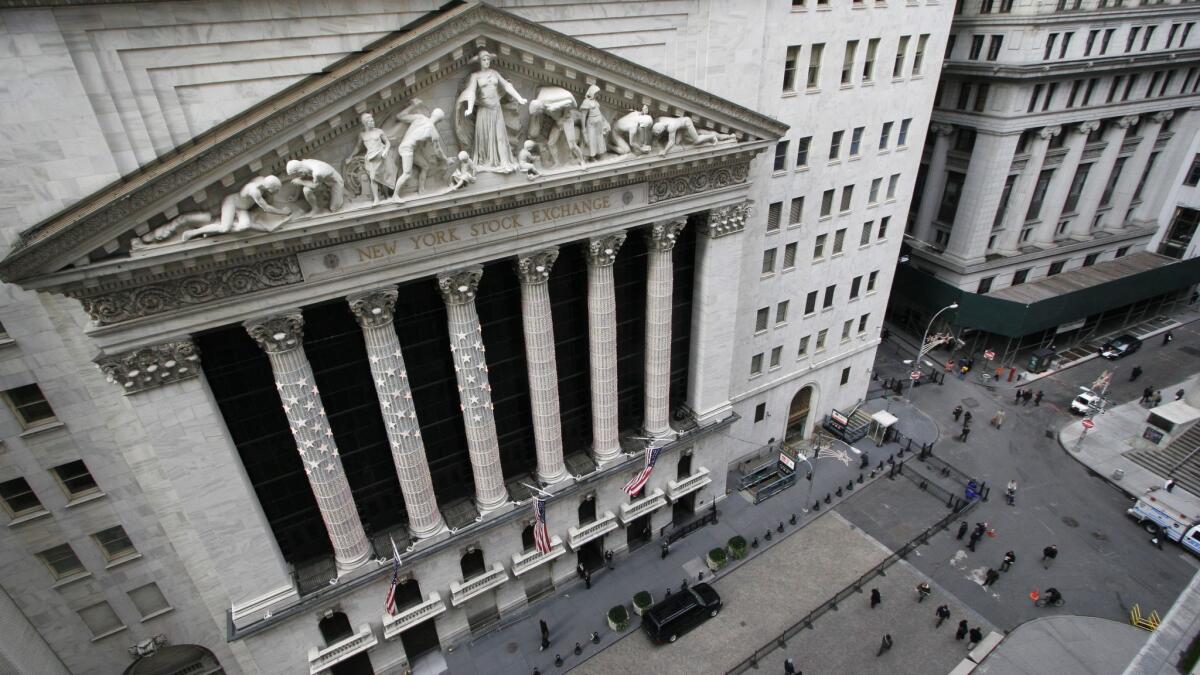Stocks slump as economic and earnings worries rise

- Share via
Renewed pessimism about the strength of the global economy and corporate profits this year led to sharp losses Thursday on Wall Street.
Technology companies, healthcare stocks and banks accounted for much of the selling. Twitter slumped almost 10% after issuing a weak forecast. Traders sought safety in U.S. government bonds, sending yields lower.
The broad sell-off followed a slide in overseas markets after European officials slashed their forecast for economic growth this year in the 19 countries that use the euro — and the Bank of England warned that the British economy is set for its weakest growth in a decade.
The moves are the latest flashpoints of worry as investors gird for predicted slowdowns in economies around the world, including the United States, and weaker corporate earnings growth.
Stocks bounced back this year after a dismal December, riding a wave of positive momentum after the Federal Reserve signaled it would take a more patient approach to raising interest rates. Corporate earnings, which have mostly come in ahead of lowered expectations, also helped lift the market this month, carrying the Standard & Poor’s 500 index to a five-day winning streak that ended Wednesday.
“We’ve come so far so fast that people were just looking for a chance to be able to say, ‘Yeah, that’s it. I’m going to take some money off the table,” said Tom Martin, senior portfolio manager at Globalt Investments.
The S&P 500 fell 25.56 points, or 0.9%, to 2,706.05. The Dow Jones industrial average lost 220.77 points, or 0.9%, to 25,169.53. The Dow was briefly down 389 points.
The Nasdaq composite slid 86.93 points, or 1.2%, to 7,288.35. The Russell 2000 index of smaller companies gave up 12.40 points, or 0.8%, to 1,505.63.
U.S. indexes took their cue early Thursday from major European markets, which tumbled after the European Union’s commission slashed its 2019 forecast for economic growth in the 19 countries that use the euro to 1.3% from an earlier forecast of 1.9%. A weaker-than-expected report on industrial production in Germany also raised concerns.
In London, the Bank of England cut its forecast for growth this year to 1.2% from an earlier forecast of 1.7%. That would be its slowest growth since 2009. The bank said it sees a 1 in 4 chance of slipping into a recession this year.
In the U.S., a report showed that the job market remains strong as fewer Americans applied for unemployment benefits last week, a sign that layoffs are low. But many economists expect the U.S. economy to slow this year as well, along with economies around the the world.
The discouraging economic forecasts coupled with some companies lowering their 2019 earnings estimates stoked jitters across the market that earnings at U.S. companies will weaken in the first three months of this year.
Across the S&P 500, analysts are forecasting earnings per share to drop 1.8% in the first quarter from a year earlier. They were calling for growth just a few weeks ago, and if the updated forecasts prove true, it will be the first decline in nearly three years.
Any decline would also be a sharp drop-off from the 12.9% growth that S&P 500 companies are expected to report for the fourth quarter of 2018.
“Is it going to be a one-quarter kind of fluke?” Martin said. “That’s what’s embedded in analysts’ estimates. Or is it going to be a multi-quarter, maybe multi-year phenomenon like it was in 2015 and 2016?”
Twitter’s latest quarterly results fed traders’ concerns about slowing corporate profits.
The company gave a better-than-expected earnings report for its latest quarter, but its stock price tumbled 9.8% after it said revenue for this quarter may fall short of some analysts’ estimates. Other social media companies also fell. Facebook dropped 2.4%.
Dunkin’ Brands fell 3% after the doughnuts chain gave 2019 guidance that fell short of what analysts were expecting.
Tapestry shares tumbled 14.8% after the owner of Kate Spade, Coach and other luxury apparel brands reported quarterly earnings and revenue that missed Wall Street’s estimates.
The resurgent jitters over the global economy sent investors toward Treasury bonds, which are seen as safer investments during tumultuous times. When a bond’s price rises, its yield falls, and the yield on the 10-year Treasury note fell to 2.66% from 2.69% late Wednesday.
The drop in the 10-year Treasury yield, which affects rates on mortgages and other consumer loans, weighed on bank shares. Wells Fargo fell 2.3%.
Benchmark U.S. crude oil dropped 2.5% to $52.64 a barrel. Natural gas slid 4.2%. That helped drag energy stocks in the S&P 500 down by 2.1%, the worst decline among the 11 sectors that make up the index. Newfield Exploration led the sector slide, dropping 6.7%.
Stocks around the world have also heaved up and down recently on concerns about U.S.-China trade tensions. U.S. Treasury Secretary Steven T. Mnuchin and trade representative Robert Lighthizer will lead a delegation to Beijing next week for the next round of trade talks, but the issues are complex. These include contentious topics such as Beijing’s technology policy and trade practices, where progress has been limited so far.
Mnuchin also said that there were no plans for President Trump to meet with Chinese leader Xi Jinping. “If there are remaining issues that we can’t get closed, I think President Trump expects that he’s going to sit down with President Xi and address those issues,” he said.
More to Read
Inside the business of entertainment
The Wide Shot brings you news, analysis and insights on everything from streaming wars to production — and what it all means for the future.
You may occasionally receive promotional content from the Los Angeles Times.










